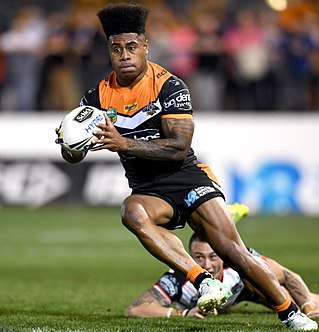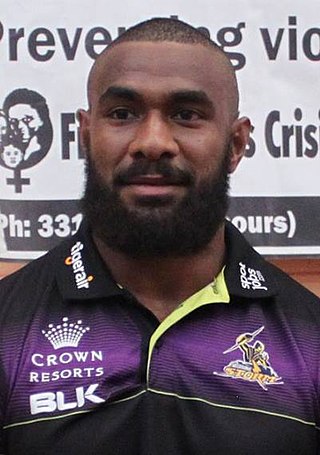
The Cibi is a Fijian meke of Bauan origin and war dance, generally performed before or after a battle. It came to prominence in the rugby field in 1939 when it was performed by the Fiji national rugby union team before the match. It is also known as Teivovo.

Articles about people, places, things, and concepts related to or originating from Fiji, include:
The Fiji national rugby league team, nicknamed the Bati, has been participating in international rugby league football since 1992. The team is controlled by the governing body for rugby league in Fiji, Fiji National Rugby League (FNRL), which is currently a member of the Asia-Pacific Rugby League Confederation (APRLC). Fiji have thrice reached the semi-finals of the Rugby League World Cup, in 2008, 2013 and 2017, and are currently ranked 6th in the International Rugby League's World Rankings. They are coached by Fijian Wise Kativerata, and their captain is Kevin Naiqama.

Nadroga-Navosa is one of the fourteen provinces of Fiji and one of eight based in Viti Levu, Fiji's largest island. It is about 2,385 square kilometers and occupies the South-West and Central areas of Viti Levu, Fiji's principal island. The province includes the Mamanuca Archipelago,Malolo Islands, off the west coast of Viti Levu, Vatulele, as well as the remote Conway Reef in the southwest. The population at the 2017 census was 58,931, being the fifth largest province. The main town in Nadroga-Navosa is Sigatoka, with a population of 9622.

Wes Naiqama is a Fijian Australian former professional rugby league footballer who last played for the London Broncos in the English Championship. He won 14 caps for the Fiji national rugby league team. He primarily played as a centre, fullback and winger, but can also fill in at second-row. He is the older brother of Huddersfield Giants player and fellow Fiji international, Kevin Naiqama.

Petero Civoniceva, is a Fijian-Australian former professional rugby league footballer who played in the 1990s, 2000s and 2010s. A Queensland State of Origin and Australian international representative prop forward, in 2009 he broke the record for most international matches for Australia of any forward in history. Civoniceva played his club football for the Brisbane Broncos, with whom he won the 1998, 2000 and 2006 NRL Premierships, as well as for the Penrith Panthers, whom he captained. Late in his career whilst playing for the Redcliffe Dolphins in the Queensland Cup, Civoniceva captained the Fiji national team in their 2013 Rugby League World Cup campaign. The Petero Civoniceva Medal is awarded to the Australian Fijian rugby league footballer of the year, while the Civoniceva Medal is awarded to the Queensland Cup player voted as the best and fairest.

Lote Daulako Tuqiri is a former professional dual-code rugby footballer who primarily played as a winger across both codes. He represented Australia in both rugby league and rugby union, and Fiji in rugby league. Tuqiri first rose to prominence as a professional rugby league footballer for the Brisbane Broncos and Queensland Maroons, as well as the Fiji and Australia national sides. He was therefore a high-profile signing for rugby union in 2002, winning 67 caps for Australia and being a part of their 2003 and 2007 World Cup squads. He played rugby union for the Waratahs in the Super 14 and Leicester Tigers in England in season 2009–10. Tuqiri's contract with the Australian Rugby Union was terminated on 1 July 2009. No immediate reason was given, and Tuqiri returned to rugby league in 2010, playing for the Wests Tigers of the NRL. In September 2013, he signed a short-term contract with Irish rugby union giants, Leinster to play in the Pro12 in a three-month deal. Just 6 weeks out from the 2014 NRL season, Tuqiri signed with his third NRL club, the South Sydney Rabbitohs, on a one-year deal.
Cyril Connell was an Australian rugby league footballer who played in the 1940s and 1950s. An Australian international and Queensland Maroons representative centre/five-eighth, he played his club football in Toowoomba and Rockhampton. At the time of his death, he had been a recruitment scout for the Brisbane Broncos club of the NRL for several years. He was also the son of former rugby league footballer and administrator Cyril Connell Sr.

Aaron Groom is a Fijian former professional rugby league footballer who last played for the Asquith Magpies in the Ron Massey Cup. Groom previously played for the Canterbury-Bankstown Bulldogs in the National Rugby League and Sheffield Eagles in the 2009 Challenge Cup. He primarily played as a halfback, but can also fill in at hooker.
Tabua Cakacaka is a Fijian former professional rugby league footballer. His position is prop/second row. He left Fiji at the age of 17 years when he was scouted by the South Sydney Rabbitohs. Since then he has held professional contracts in England, Australia and France.
Alipate Tani Noilea is a Fijian rugby league and rugby union footballer. He is a rugby league international and represented Fiji at the 2008 Rugby League World Cup.

Kevin Naiqama is a Fiji international rugby league footballer who usually plays as a centre or winger for the Huddersfield Giants in the Super League and as a fullback or five-eighth for Fiji at the International level.

Kaliova Nauqe Tani is a Fijian rugby league footballer who represented Fiji in the 2008 World Cup.

Fijian Australians refers to Australian citizens or residents of Australia who are of ethnic iTaukei or Indian descent. Most Fijians Australians live in New South Wales (Sydney), Queensland (Brisbane) and Victoria (Melbourne).

Marika Koroibete is a dual-code international rugby league and rugby union footballer. He plays for the Australia national rugby union team, and plays as a winger for the Melbourne Rebels in Super Rugby.

Eloni Vunakece is a former Fiji international rugby league footballer who played as a prop for the Sydney Roosters in the NRL. He also played for Toulouse Olympique in the French Elite One Championship.

Taqele Naiyaravoro is an Australian professional rugby union and rugby league footballer. His regular playing position is the wing.

Amenoni Nasilasila is a Fijian rugby union footballer. He had played for the Fiji sevens team. Nasilasila made his debut for Fiji 7s at the 2014 Dubai Sevens.

The Kaiviti Silktails are a semi-professional rugby league football club from Fiji competing in the NSWRL's Jersey Flegg Cup.
















